Investigating Food Tourism in Birmingham: A Research Proposal (1361)
VerifiedAdded on 2023/01/06
|13
|3942
|99
Report
AI Summary
This research proposal investigates the burgeoning popularity of food tourism and analyzes the critical factors that contribute to a successful food tourism destination, with a specific focus on Birmingham, West Midlands. The proposal outlines the research aim to assess Birmingham's potential as a leading culinary destination within the UK, outside of London. The objectives are to evaluate the concept of food tourism, assess its successful destinations, identify Birmingham's growing popularity, determine key criteria for culinary success, ascertain challenges, and recommend strategies for improvement. The research questions delve into the definition of food tourism, Birmingham's potential, key success factors, and potential challenges. The rationale highlights the increasing demand for food tourism, the need for Birmingham to compete with other food-centric cities, and the significance of food tourism in shaping consumer behavior and local identity. The methodology employs a qualitative approach, utilizing a literature review to analyze existing research. The proposal also details the research philosophy (interpretivism), approach (inductive), data collection methods (secondary data from books, journals, and research papers), and data analysis techniques (thematic analysis). The literature review examines the concept of food tourism, successful destinations, and challenges, providing a comprehensive overview of the subject. Finally, the proposal emphasizes the importance of validity and reliability in the research process, ensuring the credibility of the findings.
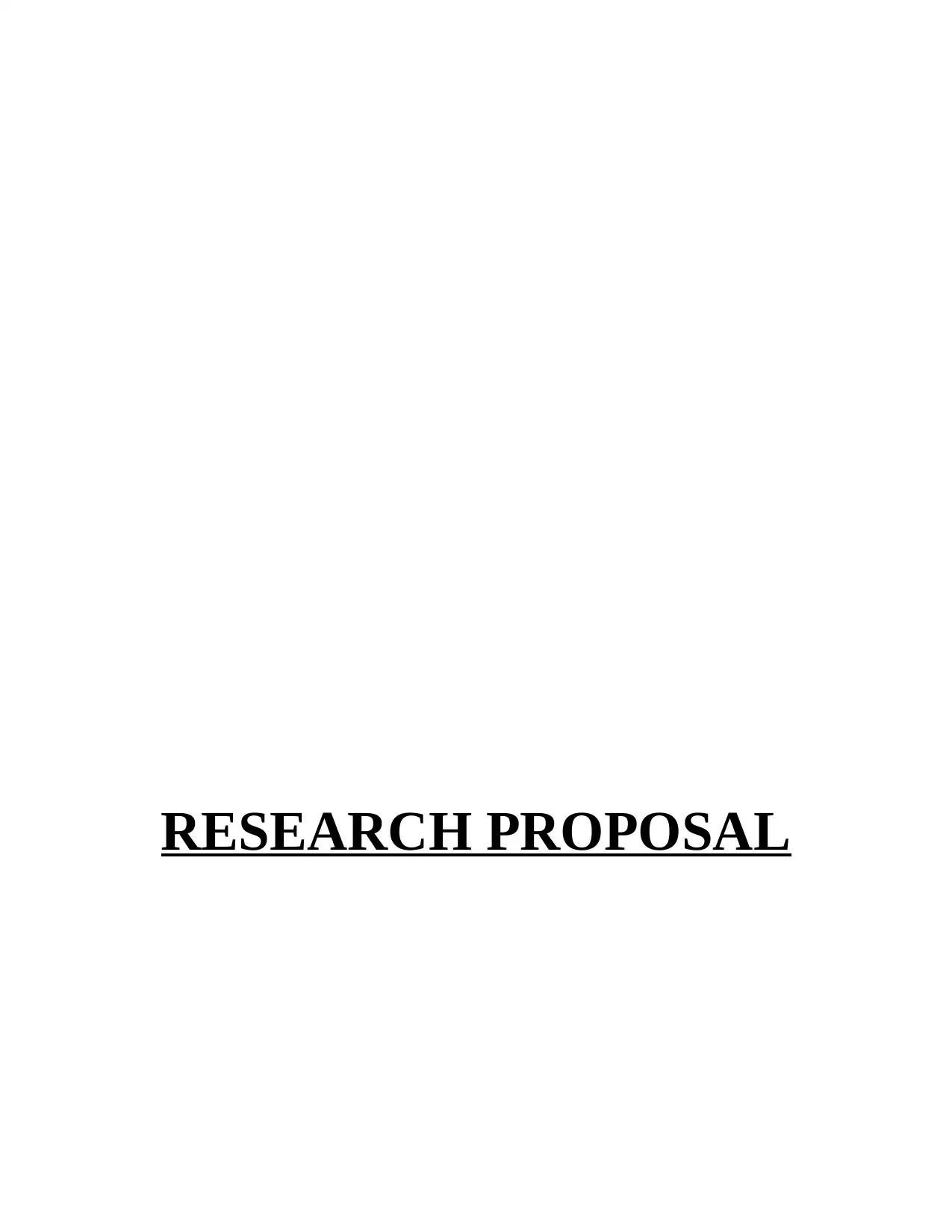
RESEARCH PROPOSAL
Paraphrase This Document
Need a fresh take? Get an instant paraphrase of this document with our AI Paraphraser
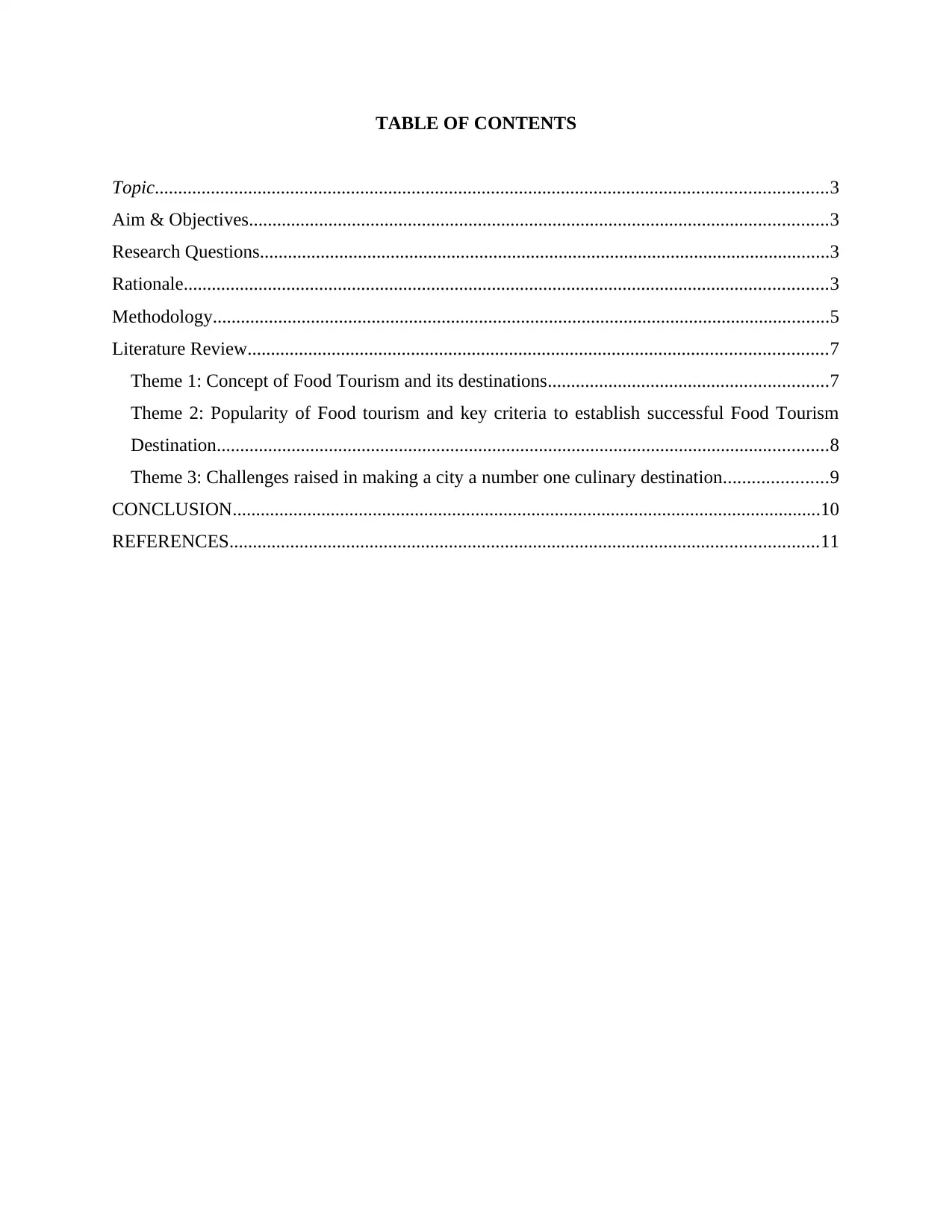
TABLE OF CONTENTS
Topic................................................................................................................................................3
Aim & Objectives............................................................................................................................3
Research Questions..........................................................................................................................3
Rationale..........................................................................................................................................3
Methodology....................................................................................................................................5
Literature Review............................................................................................................................7
Theme 1: Concept of Food Tourism and its destinations............................................................7
Theme 2: Popularity of Food tourism and key criteria to establish successful Food Tourism
Destination...................................................................................................................................8
Theme 3: Challenges raised in making a city a number one culinary destination......................9
CONCLUSION..............................................................................................................................10
REFERENCES..............................................................................................................................11
Topic................................................................................................................................................3
Aim & Objectives............................................................................................................................3
Research Questions..........................................................................................................................3
Rationale..........................................................................................................................................3
Methodology....................................................................................................................................5
Literature Review............................................................................................................................7
Theme 1: Concept of Food Tourism and its destinations............................................................7
Theme 2: Popularity of Food tourism and key criteria to establish successful Food Tourism
Destination...................................................................................................................................8
Theme 3: Challenges raised in making a city a number one culinary destination......................9
CONCLUSION..............................................................................................................................10
REFERENCES..............................................................................................................................11
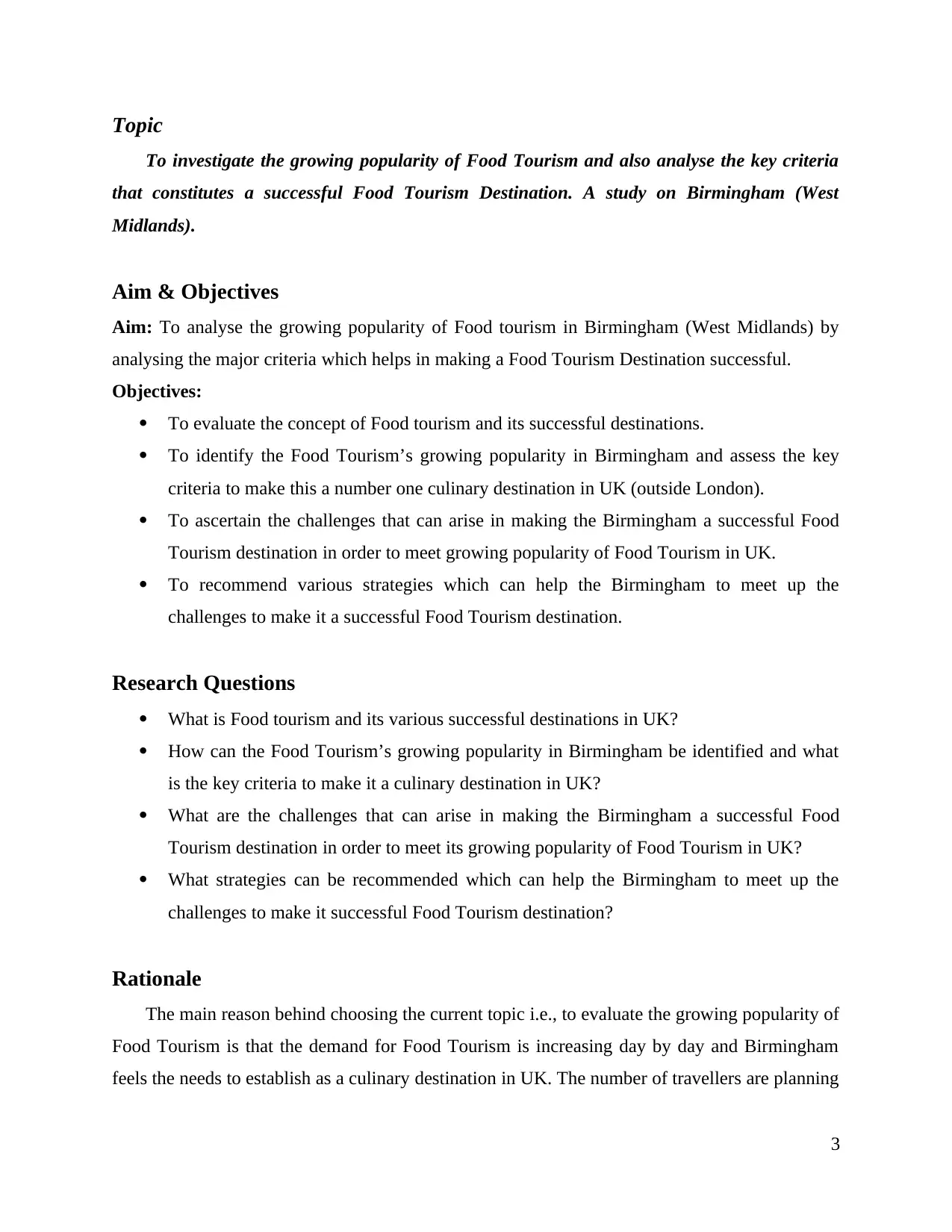
Topic
To investigate the growing popularity of Food Tourism and also analyse the key criteria
that constitutes a successful Food Tourism Destination. A study on Birmingham (West
Midlands).
Aim & Objectives
Aim: To analyse the growing popularity of Food tourism in Birmingham (West Midlands) by
analysing the major criteria which helps in making a Food Tourism Destination successful.
Objectives:
To evaluate the concept of Food tourism and its successful destinations.
To identify the Food Tourism’s growing popularity in Birmingham and assess the key
criteria to make this a number one culinary destination in UK (outside London).
To ascertain the challenges that can arise in making the Birmingham a successful Food
Tourism destination in order to meet growing popularity of Food Tourism in UK.
To recommend various strategies which can help the Birmingham to meet up the
challenges to make it a successful Food Tourism destination.
Research Questions
What is Food tourism and its various successful destinations in UK?
How can the Food Tourism’s growing popularity in Birmingham be identified and what
is the key criteria to make it a culinary destination in UK?
What are the challenges that can arise in making the Birmingham a successful Food
Tourism destination in order to meet its growing popularity of Food Tourism in UK?
What strategies can be recommended which can help the Birmingham to meet up the
challenges to make it successful Food Tourism destination?
Rationale
The main reason behind choosing the current topic i.e., to evaluate the growing popularity of
Food Tourism is that the demand for Food Tourism is increasing day by day and Birmingham
feels the needs to establish as a culinary destination in UK. The number of travellers are planning
3
To investigate the growing popularity of Food Tourism and also analyse the key criteria
that constitutes a successful Food Tourism Destination. A study on Birmingham (West
Midlands).
Aim & Objectives
Aim: To analyse the growing popularity of Food tourism in Birmingham (West Midlands) by
analysing the major criteria which helps in making a Food Tourism Destination successful.
Objectives:
To evaluate the concept of Food tourism and its successful destinations.
To identify the Food Tourism’s growing popularity in Birmingham and assess the key
criteria to make this a number one culinary destination in UK (outside London).
To ascertain the challenges that can arise in making the Birmingham a successful Food
Tourism destination in order to meet growing popularity of Food Tourism in UK.
To recommend various strategies which can help the Birmingham to meet up the
challenges to make it a successful Food Tourism destination.
Research Questions
What is Food tourism and its various successful destinations in UK?
How can the Food Tourism’s growing popularity in Birmingham be identified and what
is the key criteria to make it a culinary destination in UK?
What are the challenges that can arise in making the Birmingham a successful Food
Tourism destination in order to meet its growing popularity of Food Tourism in UK?
What strategies can be recommended which can help the Birmingham to meet up the
challenges to make it successful Food Tourism destination?
Rationale
The main reason behind choosing the current topic i.e., to evaluate the growing popularity of
Food Tourism is that the demand for Food Tourism is increasing day by day and Birmingham
feels the needs to establish as a culinary destination in UK. The number of travellers are planning
3
⊘ This is a preview!⊘
Do you want full access?
Subscribe today to unlock all pages.

Trusted by 1+ million students worldwide
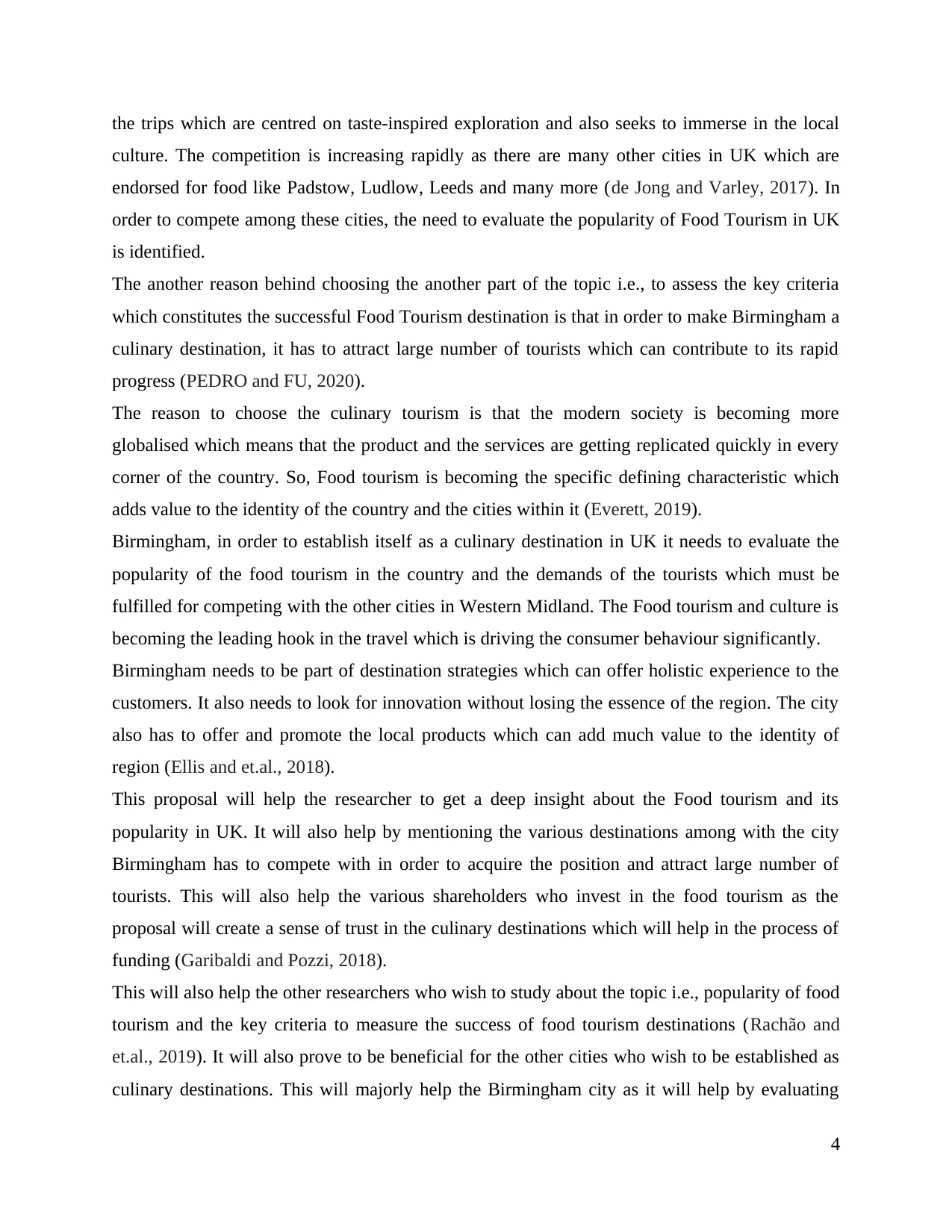
the trips which are centred on taste-inspired exploration and also seeks to immerse in the local
culture. The competition is increasing rapidly as there are many other cities in UK which are
endorsed for food like Padstow, Ludlow, Leeds and many more (de Jong and Varley, 2017). In
order to compete among these cities, the need to evaluate the popularity of Food Tourism in UK
is identified.
The another reason behind choosing the another part of the topic i.e., to assess the key criteria
which constitutes the successful Food Tourism destination is that in order to make Birmingham a
culinary destination, it has to attract large number of tourists which can contribute to its rapid
progress (PEDRO and FU, 2020).
The reason to choose the culinary tourism is that the modern society is becoming more
globalised which means that the product and the services are getting replicated quickly in every
corner of the country. So, Food tourism is becoming the specific defining characteristic which
adds value to the identity of the country and the cities within it (Everett, 2019).
Birmingham, in order to establish itself as a culinary destination in UK it needs to evaluate the
popularity of the food tourism in the country and the demands of the tourists which must be
fulfilled for competing with the other cities in Western Midland. The Food tourism and culture is
becoming the leading hook in the travel which is driving the consumer behaviour significantly.
Birmingham needs to be part of destination strategies which can offer holistic experience to the
customers. It also needs to look for innovation without losing the essence of the region. The city
also has to offer and promote the local products which can add much value to the identity of
region (Ellis and et.al., 2018).
This proposal will help the researcher to get a deep insight about the Food tourism and its
popularity in UK. It will also help by mentioning the various destinations among with the city
Birmingham has to compete with in order to acquire the position and attract large number of
tourists. This will also help the various shareholders who invest in the food tourism as the
proposal will create a sense of trust in the culinary destinations which will help in the process of
funding (Garibaldi and Pozzi, 2018).
This will also help the other researchers who wish to study about the topic i.e., popularity of food
tourism and the key criteria to measure the success of food tourism destinations (Rachão and
et.al., 2019). It will also prove to be beneficial for the other cities who wish to be established as
culinary destinations. This will majorly help the Birmingham city as it will help by evaluating
4
culture. The competition is increasing rapidly as there are many other cities in UK which are
endorsed for food like Padstow, Ludlow, Leeds and many more (de Jong and Varley, 2017). In
order to compete among these cities, the need to evaluate the popularity of Food Tourism in UK
is identified.
The another reason behind choosing the another part of the topic i.e., to assess the key criteria
which constitutes the successful Food Tourism destination is that in order to make Birmingham a
culinary destination, it has to attract large number of tourists which can contribute to its rapid
progress (PEDRO and FU, 2020).
The reason to choose the culinary tourism is that the modern society is becoming more
globalised which means that the product and the services are getting replicated quickly in every
corner of the country. So, Food tourism is becoming the specific defining characteristic which
adds value to the identity of the country and the cities within it (Everett, 2019).
Birmingham, in order to establish itself as a culinary destination in UK it needs to evaluate the
popularity of the food tourism in the country and the demands of the tourists which must be
fulfilled for competing with the other cities in Western Midland. The Food tourism and culture is
becoming the leading hook in the travel which is driving the consumer behaviour significantly.
Birmingham needs to be part of destination strategies which can offer holistic experience to the
customers. It also needs to look for innovation without losing the essence of the region. The city
also has to offer and promote the local products which can add much value to the identity of
region (Ellis and et.al., 2018).
This proposal will help the researcher to get a deep insight about the Food tourism and its
popularity in UK. It will also help by mentioning the various destinations among with the city
Birmingham has to compete with in order to acquire the position and attract large number of
tourists. This will also help the various shareholders who invest in the food tourism as the
proposal will create a sense of trust in the culinary destinations which will help in the process of
funding (Garibaldi and Pozzi, 2018).
This will also help the other researchers who wish to study about the topic i.e., popularity of food
tourism and the key criteria to measure the success of food tourism destinations (Rachão and
et.al., 2019). It will also prove to be beneficial for the other cities who wish to be established as
culinary destinations. This will majorly help the Birmingham city as it will help by evaluating
4
Paraphrase This Document
Need a fresh take? Get an instant paraphrase of this document with our AI Paraphraser
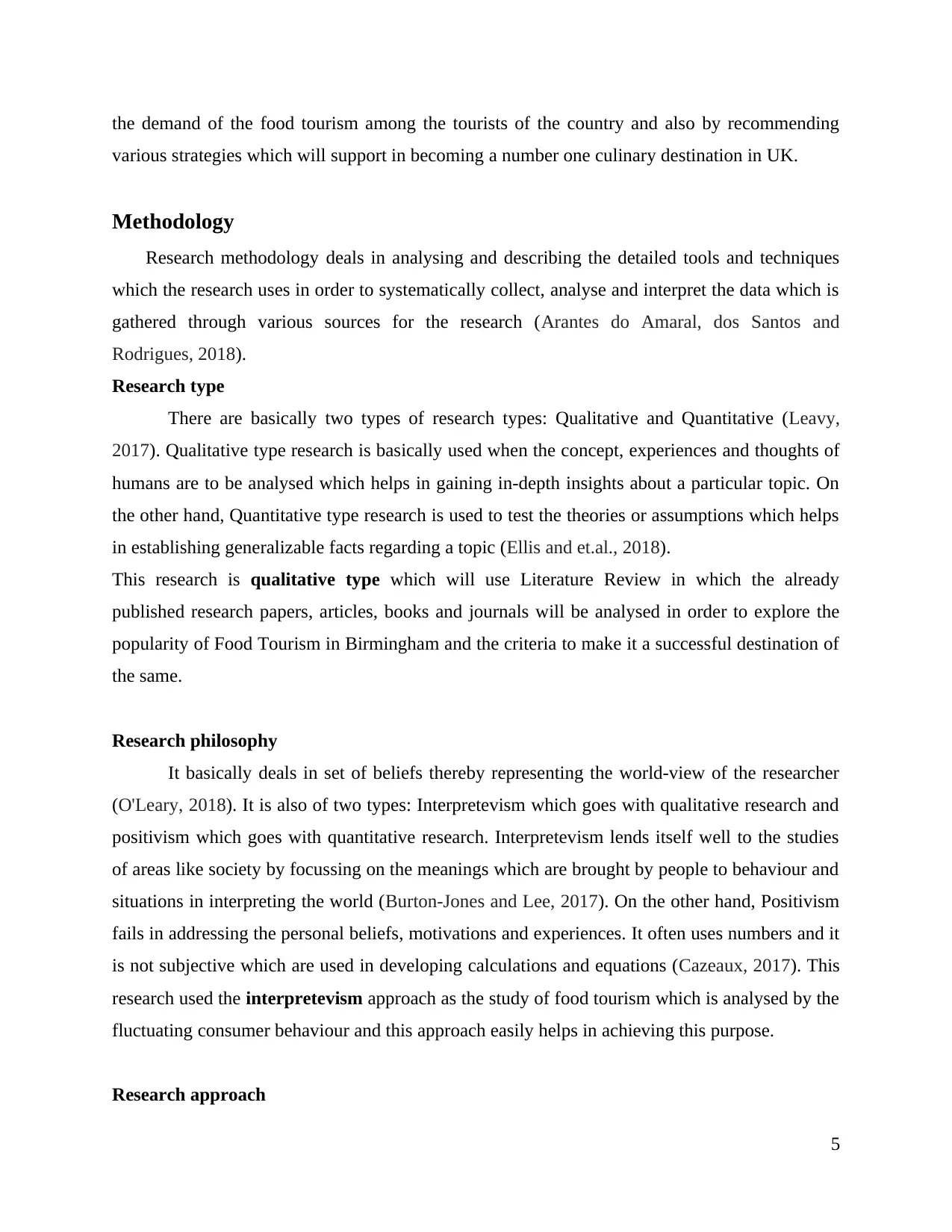
the demand of the food tourism among the tourists of the country and also by recommending
various strategies which will support in becoming a number one culinary destination in UK.
Methodology
Research methodology deals in analysing and describing the detailed tools and techniques
which the research uses in order to systematically collect, analyse and interpret the data which is
gathered through various sources for the research (Arantes do Amaral, dos Santos and
Rodrigues, 2018).
Research type
There are basically two types of research types: Qualitative and Quantitative (Leavy,
2017). Qualitative type research is basically used when the concept, experiences and thoughts of
humans are to be analysed which helps in gaining in-depth insights about a particular topic. On
the other hand, Quantitative type research is used to test the theories or assumptions which helps
in establishing generalizable facts regarding a topic (Ellis and et.al., 2018).
This research is qualitative type which will use Literature Review in which the already
published research papers, articles, books and journals will be analysed in order to explore the
popularity of Food Tourism in Birmingham and the criteria to make it a successful destination of
the same.
Research philosophy
It basically deals in set of beliefs thereby representing the world-view of the researcher
(O'Leary, 2018). It is also of two types: Interpretevism which goes with qualitative research and
positivism which goes with quantitative research. Interpretevism lends itself well to the studies
of areas like society by focussing on the meanings which are brought by people to behaviour and
situations in interpreting the world (Burton-Jones and Lee, 2017). On the other hand, Positivism
fails in addressing the personal beliefs, motivations and experiences. It often uses numbers and it
is not subjective which are used in developing calculations and equations (Cazeaux, 2017). This
research used the interpretevism approach as the study of food tourism which is analysed by the
fluctuating consumer behaviour and this approach easily helps in achieving this purpose.
Research approach
5
various strategies which will support in becoming a number one culinary destination in UK.
Methodology
Research methodology deals in analysing and describing the detailed tools and techniques
which the research uses in order to systematically collect, analyse and interpret the data which is
gathered through various sources for the research (Arantes do Amaral, dos Santos and
Rodrigues, 2018).
Research type
There are basically two types of research types: Qualitative and Quantitative (Leavy,
2017). Qualitative type research is basically used when the concept, experiences and thoughts of
humans are to be analysed which helps in gaining in-depth insights about a particular topic. On
the other hand, Quantitative type research is used to test the theories or assumptions which helps
in establishing generalizable facts regarding a topic (Ellis and et.al., 2018).
This research is qualitative type which will use Literature Review in which the already
published research papers, articles, books and journals will be analysed in order to explore the
popularity of Food Tourism in Birmingham and the criteria to make it a successful destination of
the same.
Research philosophy
It basically deals in set of beliefs thereby representing the world-view of the researcher
(O'Leary, 2018). It is also of two types: Interpretevism which goes with qualitative research and
positivism which goes with quantitative research. Interpretevism lends itself well to the studies
of areas like society by focussing on the meanings which are brought by people to behaviour and
situations in interpreting the world (Burton-Jones and Lee, 2017). On the other hand, Positivism
fails in addressing the personal beliefs, motivations and experiences. It often uses numbers and it
is not subjective which are used in developing calculations and equations (Cazeaux, 2017). This
research used the interpretevism approach as the study of food tourism which is analysed by the
fluctuating consumer behaviour and this approach easily helps in achieving this purpose.
Research approach
5
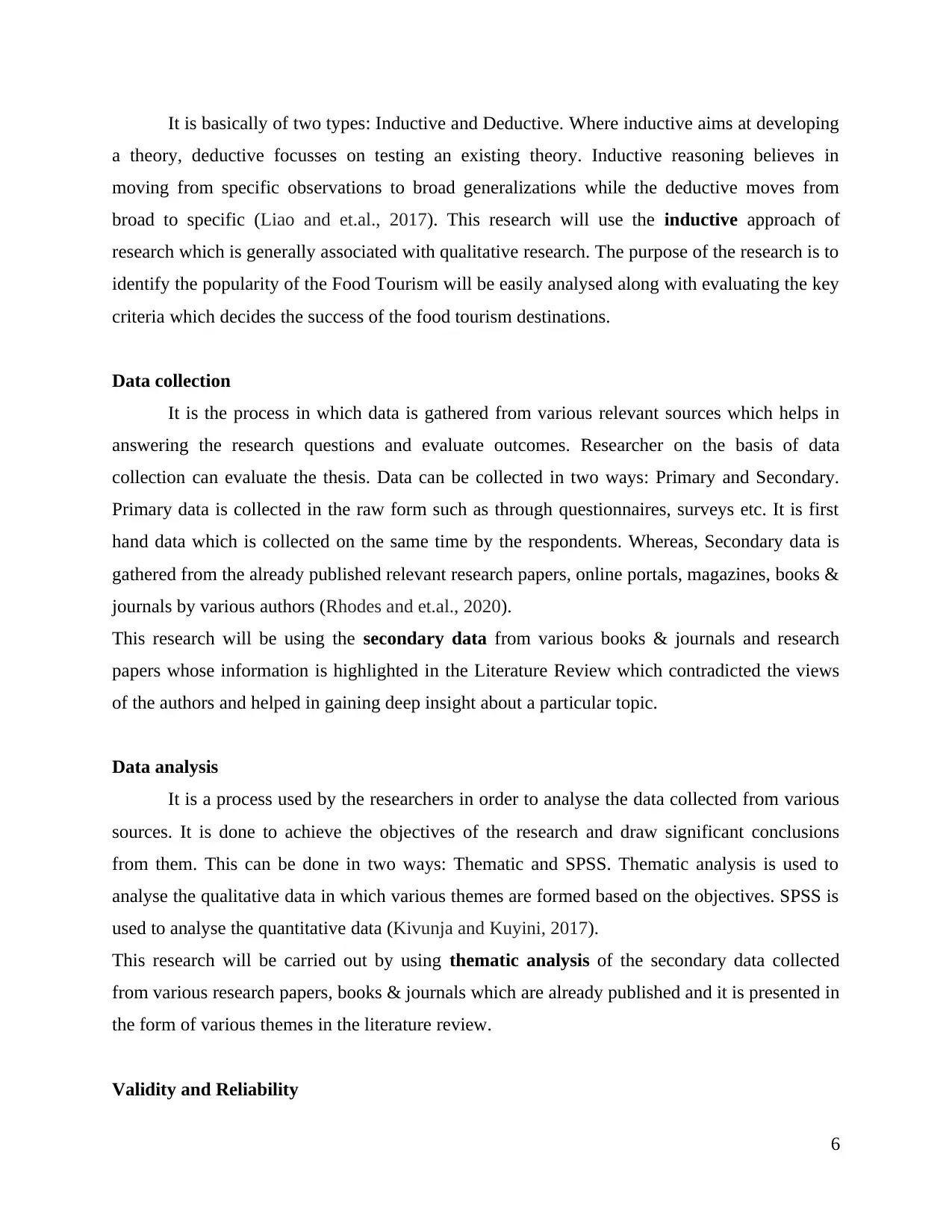
It is basically of two types: Inductive and Deductive. Where inductive aims at developing
a theory, deductive focusses on testing an existing theory. Inductive reasoning believes in
moving from specific observations to broad generalizations while the deductive moves from
broad to specific (Liao and et.al., 2017). This research will use the inductive approach of
research which is generally associated with qualitative research. The purpose of the research is to
identify the popularity of the Food Tourism will be easily analysed along with evaluating the key
criteria which decides the success of the food tourism destinations.
Data collection
It is the process in which data is gathered from various relevant sources which helps in
answering the research questions and evaluate outcomes. Researcher on the basis of data
collection can evaluate the thesis. Data can be collected in two ways: Primary and Secondary.
Primary data is collected in the raw form such as through questionnaires, surveys etc. It is first
hand data which is collected on the same time by the respondents. Whereas, Secondary data is
gathered from the already published relevant research papers, online portals, magazines, books &
journals by various authors (Rhodes and et.al., 2020).
This research will be using the secondary data from various books & journals and research
papers whose information is highlighted in the Literature Review which contradicted the views
of the authors and helped in gaining deep insight about a particular topic.
Data analysis
It is a process used by the researchers in order to analyse the data collected from various
sources. It is done to achieve the objectives of the research and draw significant conclusions
from them. This can be done in two ways: Thematic and SPSS. Thematic analysis is used to
analyse the qualitative data in which various themes are formed based on the objectives. SPSS is
used to analyse the quantitative data (Kivunja and Kuyini, 2017).
This research will be carried out by using thematic analysis of the secondary data collected
from various research papers, books & journals which are already published and it is presented in
the form of various themes in the literature review.
Validity and Reliability
6
a theory, deductive focusses on testing an existing theory. Inductive reasoning believes in
moving from specific observations to broad generalizations while the deductive moves from
broad to specific (Liao and et.al., 2017). This research will use the inductive approach of
research which is generally associated with qualitative research. The purpose of the research is to
identify the popularity of the Food Tourism will be easily analysed along with evaluating the key
criteria which decides the success of the food tourism destinations.
Data collection
It is the process in which data is gathered from various relevant sources which helps in
answering the research questions and evaluate outcomes. Researcher on the basis of data
collection can evaluate the thesis. Data can be collected in two ways: Primary and Secondary.
Primary data is collected in the raw form such as through questionnaires, surveys etc. It is first
hand data which is collected on the same time by the respondents. Whereas, Secondary data is
gathered from the already published relevant research papers, online portals, magazines, books &
journals by various authors (Rhodes and et.al., 2020).
This research will be using the secondary data from various books & journals and research
papers whose information is highlighted in the Literature Review which contradicted the views
of the authors and helped in gaining deep insight about a particular topic.
Data analysis
It is a process used by the researchers in order to analyse the data collected from various
sources. It is done to achieve the objectives of the research and draw significant conclusions
from them. This can be done in two ways: Thematic and SPSS. Thematic analysis is used to
analyse the qualitative data in which various themes are formed based on the objectives. SPSS is
used to analyse the quantitative data (Kivunja and Kuyini, 2017).
This research will be carried out by using thematic analysis of the secondary data collected
from various research papers, books & journals which are already published and it is presented in
the form of various themes in the literature review.
Validity and Reliability
6
⊘ This is a preview!⊘
Do you want full access?
Subscribe today to unlock all pages.

Trusted by 1+ million students worldwide
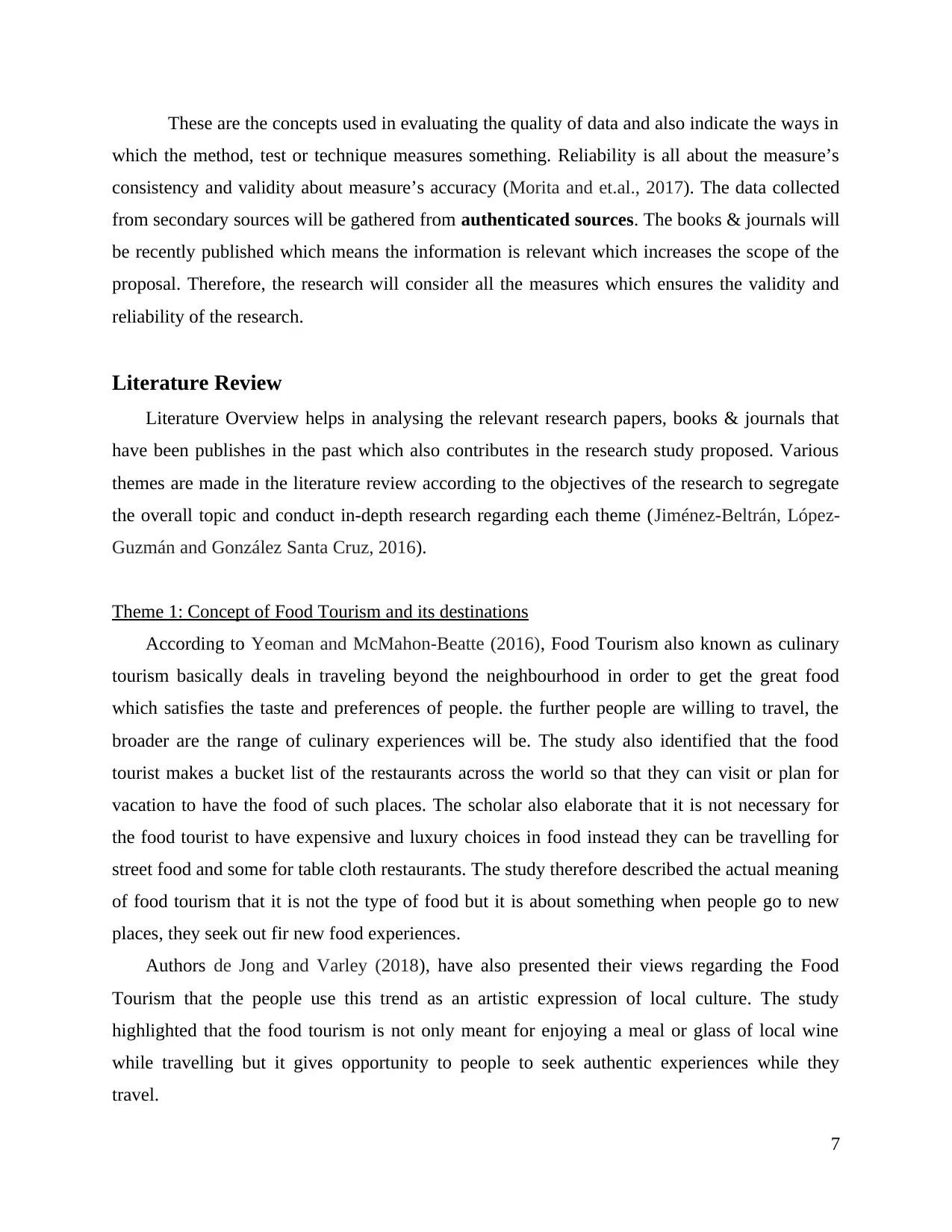
These are the concepts used in evaluating the quality of data and also indicate the ways in
which the method, test or technique measures something. Reliability is all about the measure’s
consistency and validity about measure’s accuracy (Morita and et.al., 2017). The data collected
from secondary sources will be gathered from authenticated sources. The books & journals will
be recently published which means the information is relevant which increases the scope of the
proposal. Therefore, the research will consider all the measures which ensures the validity and
reliability of the research.
Literature Review
Literature Overview helps in analysing the relevant research papers, books & journals that
have been publishes in the past which also contributes in the research study proposed. Various
themes are made in the literature review according to the objectives of the research to segregate
the overall topic and conduct in-depth research regarding each theme (Jiménez-Beltrán, López-
Guzmán and González Santa Cruz, 2016).
Theme 1: Concept of Food Tourism and its destinations
According to Yeoman and McMahon-Beatte (2016), Food Tourism also known as culinary
tourism basically deals in traveling beyond the neighbourhood in order to get the great food
which satisfies the taste and preferences of people. the further people are willing to travel, the
broader are the range of culinary experiences will be. The study also identified that the food
tourist makes a bucket list of the restaurants across the world so that they can visit or plan for
vacation to have the food of such places. The scholar also elaborate that it is not necessary for
the food tourist to have expensive and luxury choices in food instead they can be travelling for
street food and some for table cloth restaurants. The study therefore described the actual meaning
of food tourism that it is not the type of food but it is about something when people go to new
places, they seek out fir new food experiences.
Authors de Jong and Varley (2018), have also presented their views regarding the Food
Tourism that the people use this trend as an artistic expression of local culture. The study
highlighted that the food tourism is not only meant for enjoying a meal or glass of local wine
while travelling but it gives opportunity to people to seek authentic experiences while they
travel.
7
which the method, test or technique measures something. Reliability is all about the measure’s
consistency and validity about measure’s accuracy (Morita and et.al., 2017). The data collected
from secondary sources will be gathered from authenticated sources. The books & journals will
be recently published which means the information is relevant which increases the scope of the
proposal. Therefore, the research will consider all the measures which ensures the validity and
reliability of the research.
Literature Review
Literature Overview helps in analysing the relevant research papers, books & journals that
have been publishes in the past which also contributes in the research study proposed. Various
themes are made in the literature review according to the objectives of the research to segregate
the overall topic and conduct in-depth research regarding each theme (Jiménez-Beltrán, López-
Guzmán and González Santa Cruz, 2016).
Theme 1: Concept of Food Tourism and its destinations
According to Yeoman and McMahon-Beatte (2016), Food Tourism also known as culinary
tourism basically deals in traveling beyond the neighbourhood in order to get the great food
which satisfies the taste and preferences of people. the further people are willing to travel, the
broader are the range of culinary experiences will be. The study also identified that the food
tourist makes a bucket list of the restaurants across the world so that they can visit or plan for
vacation to have the food of such places. The scholar also elaborate that it is not necessary for
the food tourist to have expensive and luxury choices in food instead they can be travelling for
street food and some for table cloth restaurants. The study therefore described the actual meaning
of food tourism that it is not the type of food but it is about something when people go to new
places, they seek out fir new food experiences.
Authors de Jong and Varley (2018), have also presented their views regarding the Food
Tourism that the people use this trend as an artistic expression of local culture. The study
highlighted that the food tourism is not only meant for enjoying a meal or glass of local wine
while travelling but it gives opportunity to people to seek authentic experiences while they
travel.
7
Paraphrase This Document
Need a fresh take? Get an instant paraphrase of this document with our AI Paraphraser
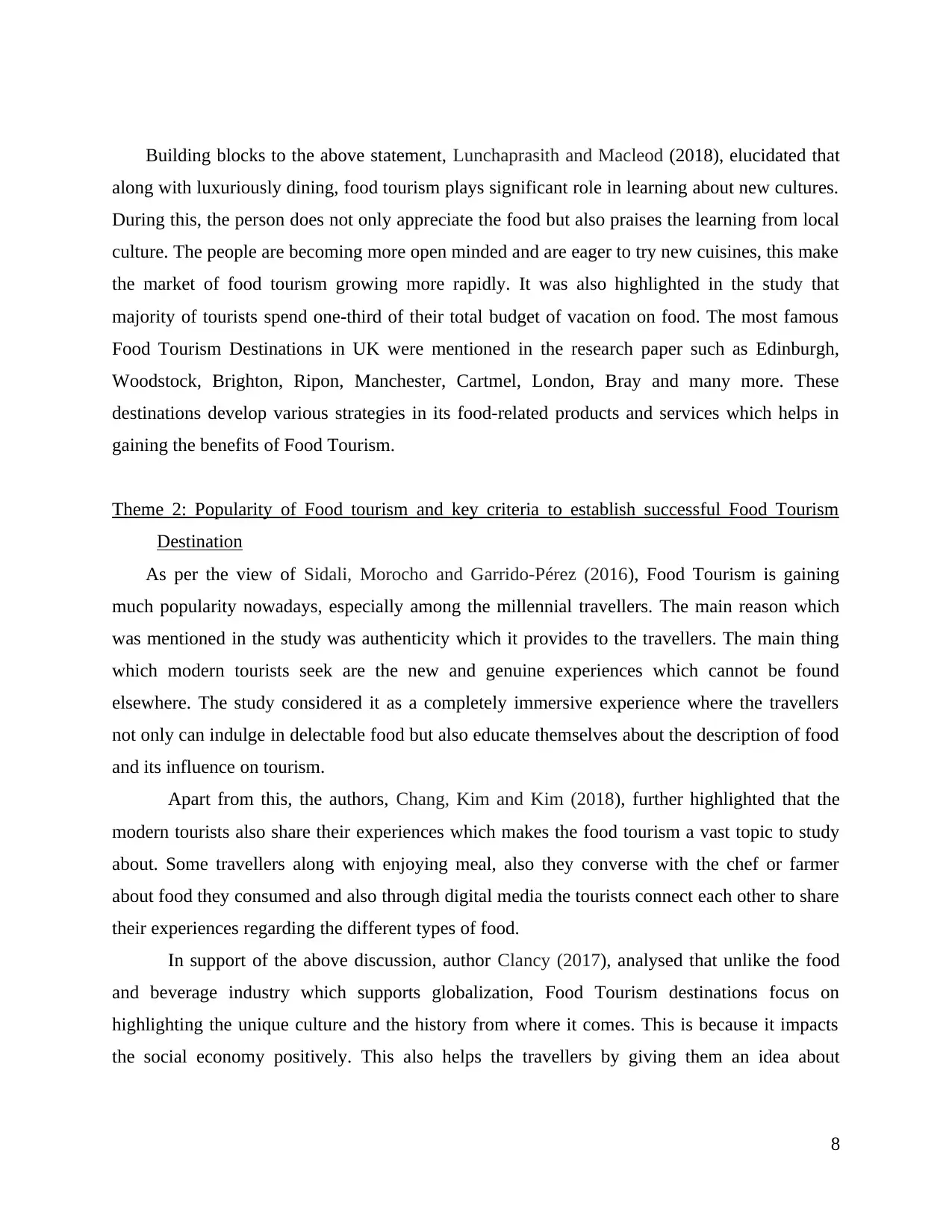
Building blocks to the above statement, Lunchaprasith and Macleod (2018), elucidated that
along with luxuriously dining, food tourism plays significant role in learning about new cultures.
During this, the person does not only appreciate the food but also praises the learning from local
culture. The people are becoming more open minded and are eager to try new cuisines, this make
the market of food tourism growing more rapidly. It was also highlighted in the study that
majority of tourists spend one-third of their total budget of vacation on food. The most famous
Food Tourism Destinations in UK were mentioned in the research paper such as Edinburgh,
Woodstock, Brighton, Ripon, Manchester, Cartmel, London, Bray and many more. These
destinations develop various strategies in its food-related products and services which helps in
gaining the benefits of Food Tourism.
Theme 2: Popularity of Food tourism and key criteria to establish successful Food Tourism
Destination
As per the view of Sidali, Morocho and Garrido-Pérez (2016), Food Tourism is gaining
much popularity nowadays, especially among the millennial travellers. The main reason which
was mentioned in the study was authenticity which it provides to the travellers. The main thing
which modern tourists seek are the new and genuine experiences which cannot be found
elsewhere. The study considered it as a completely immersive experience where the travellers
not only can indulge in delectable food but also educate themselves about the description of food
and its influence on tourism.
Apart from this, the authors, Chang, Kim and Kim (2018), further highlighted that the
modern tourists also share their experiences which makes the food tourism a vast topic to study
about. Some travellers along with enjoying meal, also they converse with the chef or farmer
about food they consumed and also through digital media the tourists connect each other to share
their experiences regarding the different types of food.
In support of the above discussion, author Clancy (2017), analysed that unlike the food
and beverage industry which supports globalization, Food Tourism destinations focus on
highlighting the unique culture and the history from where it comes. This is because it impacts
the social economy positively. This also helps the travellers by giving them an idea about
8
along with luxuriously dining, food tourism plays significant role in learning about new cultures.
During this, the person does not only appreciate the food but also praises the learning from local
culture. The people are becoming more open minded and are eager to try new cuisines, this make
the market of food tourism growing more rapidly. It was also highlighted in the study that
majority of tourists spend one-third of their total budget of vacation on food. The most famous
Food Tourism Destinations in UK were mentioned in the research paper such as Edinburgh,
Woodstock, Brighton, Ripon, Manchester, Cartmel, London, Bray and many more. These
destinations develop various strategies in its food-related products and services which helps in
gaining the benefits of Food Tourism.
Theme 2: Popularity of Food tourism and key criteria to establish successful Food Tourism
Destination
As per the view of Sidali, Morocho and Garrido-Pérez (2016), Food Tourism is gaining
much popularity nowadays, especially among the millennial travellers. The main reason which
was mentioned in the study was authenticity which it provides to the travellers. The main thing
which modern tourists seek are the new and genuine experiences which cannot be found
elsewhere. The study considered it as a completely immersive experience where the travellers
not only can indulge in delectable food but also educate themselves about the description of food
and its influence on tourism.
Apart from this, the authors, Chang, Kim and Kim (2018), further highlighted that the
modern tourists also share their experiences which makes the food tourism a vast topic to study
about. Some travellers along with enjoying meal, also they converse with the chef or farmer
about food they consumed and also through digital media the tourists connect each other to share
their experiences regarding the different types of food.
In support of the above discussion, author Clancy (2017), analysed that unlike the food
and beverage industry which supports globalization, Food Tourism destinations focus on
highlighting the unique culture and the history from where it comes. This is because it impacts
the social economy positively. This also helps the travellers by giving them an idea about
8
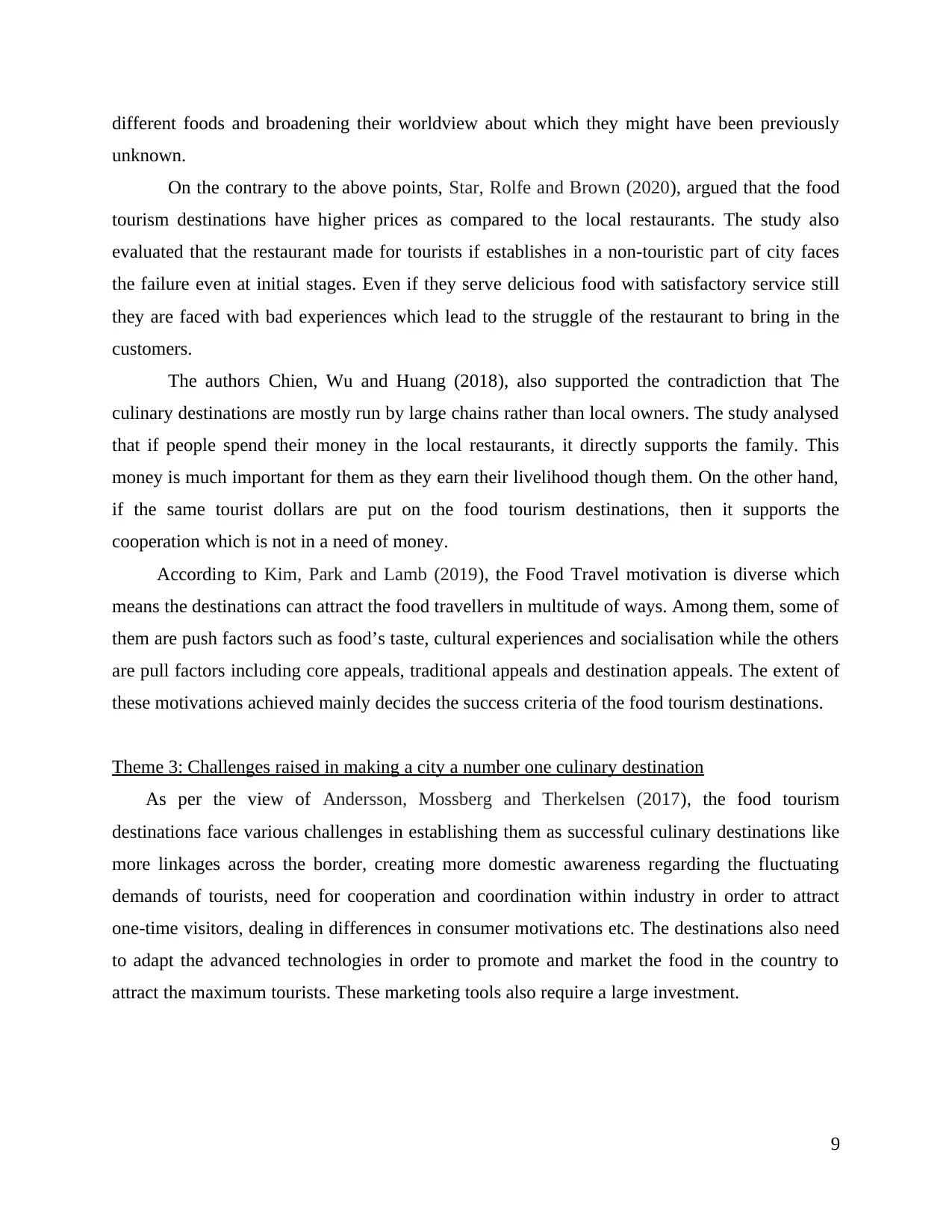
different foods and broadening their worldview about which they might have been previously
unknown.
On the contrary to the above points, Star, Rolfe and Brown (2020), argued that the food
tourism destinations have higher prices as compared to the local restaurants. The study also
evaluated that the restaurant made for tourists if establishes in a non-touristic part of city faces
the failure even at initial stages. Even if they serve delicious food with satisfactory service still
they are faced with bad experiences which lead to the struggle of the restaurant to bring in the
customers.
The authors Chien, Wu and Huang (2018), also supported the contradiction that The
culinary destinations are mostly run by large chains rather than local owners. The study analysed
that if people spend their money in the local restaurants, it directly supports the family. This
money is much important for them as they earn their livelihood though them. On the other hand,
if the same tourist dollars are put on the food tourism destinations, then it supports the
cooperation which is not in a need of money.
According to Kim, Park and Lamb (2019), the Food Travel motivation is diverse which
means the destinations can attract the food travellers in multitude of ways. Among them, some of
them are push factors such as food’s taste, cultural experiences and socialisation while the others
are pull factors including core appeals, traditional appeals and destination appeals. The extent of
these motivations achieved mainly decides the success criteria of the food tourism destinations.
Theme 3: Challenges raised in making a city a number one culinary destination
As per the view of Andersson, Mossberg and Therkelsen (2017), the food tourism
destinations face various challenges in establishing them as successful culinary destinations like
more linkages across the border, creating more domestic awareness regarding the fluctuating
demands of tourists, need for cooperation and coordination within industry in order to attract
one-time visitors, dealing in differences in consumer motivations etc. The destinations also need
to adapt the advanced technologies in order to promote and market the food in the country to
attract the maximum tourists. These marketing tools also require a large investment.
9
unknown.
On the contrary to the above points, Star, Rolfe and Brown (2020), argued that the food
tourism destinations have higher prices as compared to the local restaurants. The study also
evaluated that the restaurant made for tourists if establishes in a non-touristic part of city faces
the failure even at initial stages. Even if they serve delicious food with satisfactory service still
they are faced with bad experiences which lead to the struggle of the restaurant to bring in the
customers.
The authors Chien, Wu and Huang (2018), also supported the contradiction that The
culinary destinations are mostly run by large chains rather than local owners. The study analysed
that if people spend their money in the local restaurants, it directly supports the family. This
money is much important for them as they earn their livelihood though them. On the other hand,
if the same tourist dollars are put on the food tourism destinations, then it supports the
cooperation which is not in a need of money.
According to Kim, Park and Lamb (2019), the Food Travel motivation is diverse which
means the destinations can attract the food travellers in multitude of ways. Among them, some of
them are push factors such as food’s taste, cultural experiences and socialisation while the others
are pull factors including core appeals, traditional appeals and destination appeals. The extent of
these motivations achieved mainly decides the success criteria of the food tourism destinations.
Theme 3: Challenges raised in making a city a number one culinary destination
As per the view of Andersson, Mossberg and Therkelsen (2017), the food tourism
destinations face various challenges in establishing them as successful culinary destinations like
more linkages across the border, creating more domestic awareness regarding the fluctuating
demands of tourists, need for cooperation and coordination within industry in order to attract
one-time visitors, dealing in differences in consumer motivations etc. The destinations also need
to adapt the advanced technologies in order to promote and market the food in the country to
attract the maximum tourists. These marketing tools also require a large investment.
9
⊘ This is a preview!⊘
Do you want full access?
Subscribe today to unlock all pages.

Trusted by 1+ million students worldwide
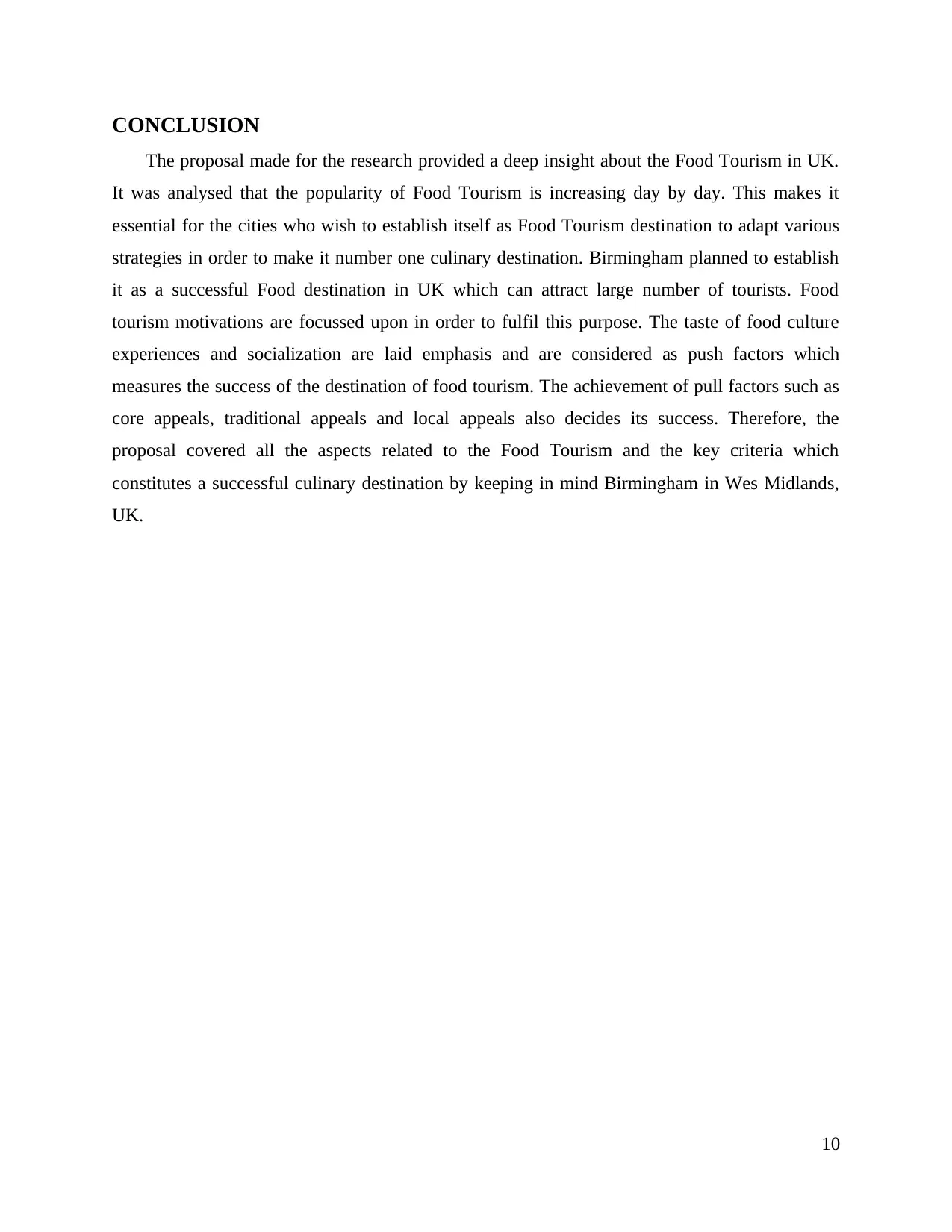
CONCLUSION
The proposal made for the research provided a deep insight about the Food Tourism in UK.
It was analysed that the popularity of Food Tourism is increasing day by day. This makes it
essential for the cities who wish to establish itself as Food Tourism destination to adapt various
strategies in order to make it number one culinary destination. Birmingham planned to establish
it as a successful Food destination in UK which can attract large number of tourists. Food
tourism motivations are focussed upon in order to fulfil this purpose. The taste of food culture
experiences and socialization are laid emphasis and are considered as push factors which
measures the success of the destination of food tourism. The achievement of pull factors such as
core appeals, traditional appeals and local appeals also decides its success. Therefore, the
proposal covered all the aspects related to the Food Tourism and the key criteria which
constitutes a successful culinary destination by keeping in mind Birmingham in Wes Midlands,
UK.
10
The proposal made for the research provided a deep insight about the Food Tourism in UK.
It was analysed that the popularity of Food Tourism is increasing day by day. This makes it
essential for the cities who wish to establish itself as Food Tourism destination to adapt various
strategies in order to make it number one culinary destination. Birmingham planned to establish
it as a successful Food destination in UK which can attract large number of tourists. Food
tourism motivations are focussed upon in order to fulfil this purpose. The taste of food culture
experiences and socialization are laid emphasis and are considered as push factors which
measures the success of the destination of food tourism. The achievement of pull factors such as
core appeals, traditional appeals and local appeals also decides its success. Therefore, the
proposal covered all the aspects related to the Food Tourism and the key criteria which
constitutes a successful culinary destination by keeping in mind Birmingham in Wes Midlands,
UK.
10
Paraphrase This Document
Need a fresh take? Get an instant paraphrase of this document with our AI Paraphraser
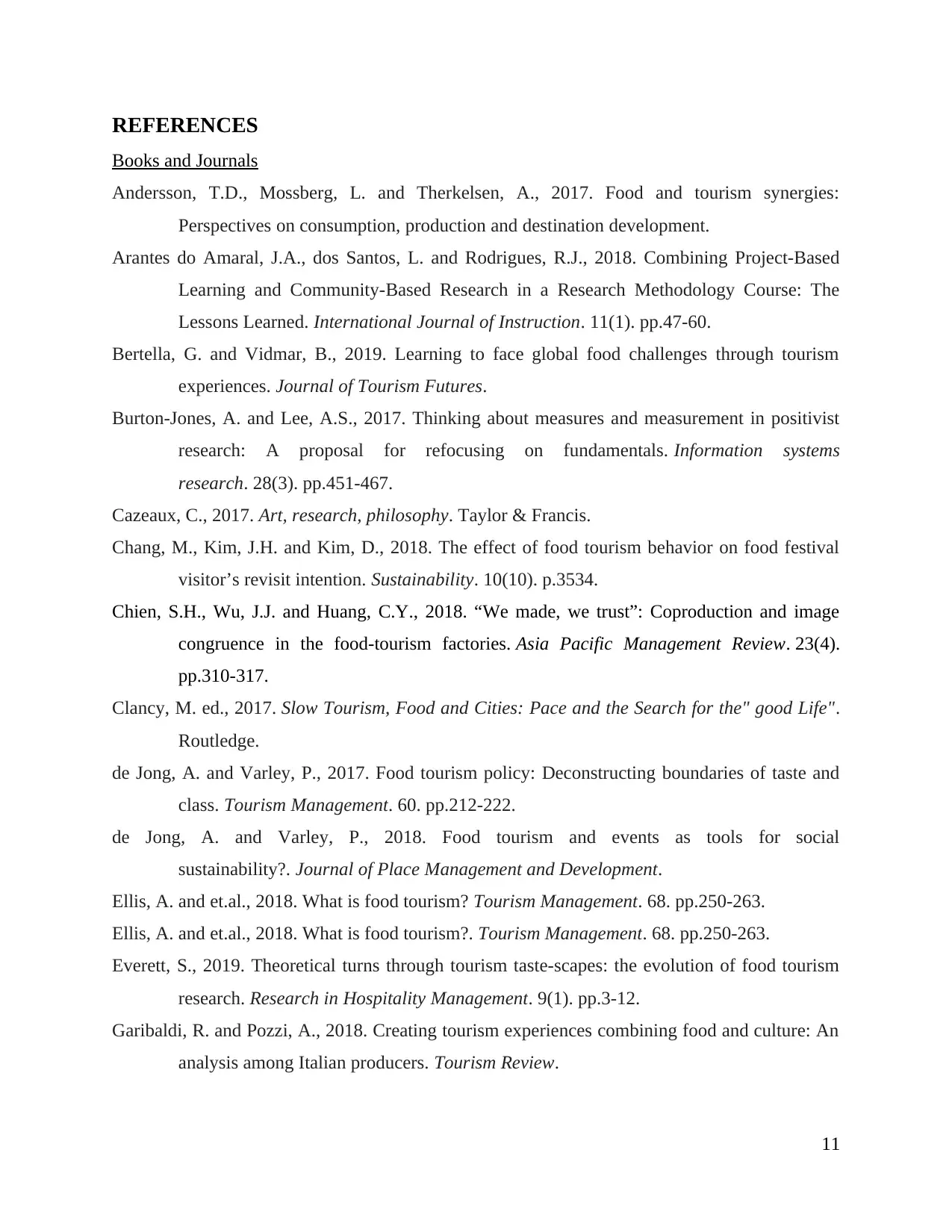
REFERENCES
Books and Journals
Andersson, T.D., Mossberg, L. and Therkelsen, A., 2017. Food and tourism synergies:
Perspectives on consumption, production and destination development.
Arantes do Amaral, J.A., dos Santos, L. and Rodrigues, R.J., 2018. Combining Project-Based
Learning and Community-Based Research in a Research Methodology Course: The
Lessons Learned. International Journal of Instruction. 11(1). pp.47-60.
Bertella, G. and Vidmar, B., 2019. Learning to face global food challenges through tourism
experiences. Journal of Tourism Futures.
Burton-Jones, A. and Lee, A.S., 2017. Thinking about measures and measurement in positivist
research: A proposal for refocusing on fundamentals. Information systems
research. 28(3). pp.451-467.
Cazeaux, C., 2017. Art, research, philosophy. Taylor & Francis.
Chang, M., Kim, J.H. and Kim, D., 2018. The effect of food tourism behavior on food festival
visitor’s revisit intention. Sustainability. 10(10). p.3534.
Chien, S.H., Wu, J.J. and Huang, C.Y., 2018. “We made, we trust”: Coproduction and image
congruence in the food-tourism factories. Asia Pacific Management Review. 23(4).
pp.310-317.
Clancy, M. ed., 2017. Slow Tourism, Food and Cities: Pace and the Search for the" good Life".
Routledge.
de Jong, A. and Varley, P., 2017. Food tourism policy: Deconstructing boundaries of taste and
class. Tourism Management. 60. pp.212-222.
de Jong, A. and Varley, P., 2018. Food tourism and events as tools for social
sustainability?. Journal of Place Management and Development.
Ellis, A. and et.al., 2018. What is food tourism? Tourism Management. 68. pp.250-263.
Ellis, A. and et.al., 2018. What is food tourism?. Tourism Management. 68. pp.250-263.
Everett, S., 2019. Theoretical turns through tourism taste-scapes: the evolution of food tourism
research. Research in Hospitality Management. 9(1). pp.3-12.
Garibaldi, R. and Pozzi, A., 2018. Creating tourism experiences combining food and culture: An
analysis among Italian producers. Tourism Review.
11
Books and Journals
Andersson, T.D., Mossberg, L. and Therkelsen, A., 2017. Food and tourism synergies:
Perspectives on consumption, production and destination development.
Arantes do Amaral, J.A., dos Santos, L. and Rodrigues, R.J., 2018. Combining Project-Based
Learning and Community-Based Research in a Research Methodology Course: The
Lessons Learned. International Journal of Instruction. 11(1). pp.47-60.
Bertella, G. and Vidmar, B., 2019. Learning to face global food challenges through tourism
experiences. Journal of Tourism Futures.
Burton-Jones, A. and Lee, A.S., 2017. Thinking about measures and measurement in positivist
research: A proposal for refocusing on fundamentals. Information systems
research. 28(3). pp.451-467.
Cazeaux, C., 2017. Art, research, philosophy. Taylor & Francis.
Chang, M., Kim, J.H. and Kim, D., 2018. The effect of food tourism behavior on food festival
visitor’s revisit intention. Sustainability. 10(10). p.3534.
Chien, S.H., Wu, J.J. and Huang, C.Y., 2018. “We made, we trust”: Coproduction and image
congruence in the food-tourism factories. Asia Pacific Management Review. 23(4).
pp.310-317.
Clancy, M. ed., 2017. Slow Tourism, Food and Cities: Pace and the Search for the" good Life".
Routledge.
de Jong, A. and Varley, P., 2017. Food tourism policy: Deconstructing boundaries of taste and
class. Tourism Management. 60. pp.212-222.
de Jong, A. and Varley, P., 2018. Food tourism and events as tools for social
sustainability?. Journal of Place Management and Development.
Ellis, A. and et.al., 2018. What is food tourism? Tourism Management. 68. pp.250-263.
Ellis, A. and et.al., 2018. What is food tourism?. Tourism Management. 68. pp.250-263.
Everett, S., 2019. Theoretical turns through tourism taste-scapes: the evolution of food tourism
research. Research in Hospitality Management. 9(1). pp.3-12.
Garibaldi, R. and Pozzi, A., 2018. Creating tourism experiences combining food and culture: An
analysis among Italian producers. Tourism Review.
11
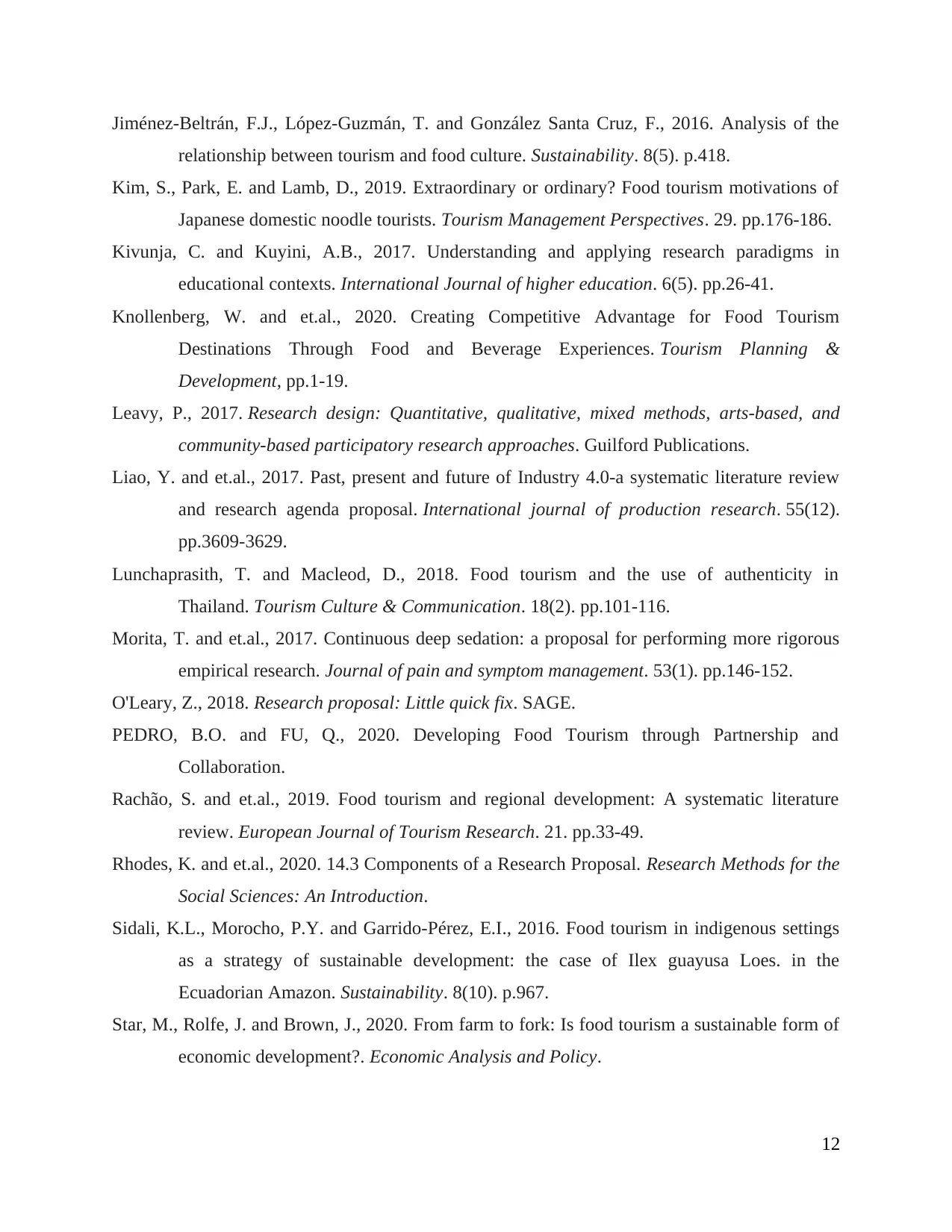
Jiménez-Beltrán, F.J., López-Guzmán, T. and González Santa Cruz, F., 2016. Analysis of the
relationship between tourism and food culture. Sustainability. 8(5). p.418.
Kim, S., Park, E. and Lamb, D., 2019. Extraordinary or ordinary? Food tourism motivations of
Japanese domestic noodle tourists. Tourism Management Perspectives. 29. pp.176-186.
Kivunja, C. and Kuyini, A.B., 2017. Understanding and applying research paradigms in
educational contexts. International Journal of higher education. 6(5). pp.26-41.
Knollenberg, W. and et.al., 2020. Creating Competitive Advantage for Food Tourism
Destinations Through Food and Beverage Experiences. Tourism Planning &
Development, pp.1-19.
Leavy, P., 2017. Research design: Quantitative, qualitative, mixed methods, arts-based, and
community-based participatory research approaches. Guilford Publications.
Liao, Y. and et.al., 2017. Past, present and future of Industry 4.0-a systematic literature review
and research agenda proposal. International journal of production research. 55(12).
pp.3609-3629.
Lunchaprasith, T. and Macleod, D., 2018. Food tourism and the use of authenticity in
Thailand. Tourism Culture & Communication. 18(2). pp.101-116.
Morita, T. and et.al., 2017. Continuous deep sedation: a proposal for performing more rigorous
empirical research. Journal of pain and symptom management. 53(1). pp.146-152.
O'Leary, Z., 2018. Research proposal: Little quick fix. SAGE.
PEDRO, B.O. and FU, Q., 2020. Developing Food Tourism through Partnership and
Collaboration.
Rachão, S. and et.al., 2019. Food tourism and regional development: A systematic literature
review. European Journal of Tourism Research. 21. pp.33-49.
Rhodes, K. and et.al., 2020. 14.3 Components of a Research Proposal. Research Methods for the
Social Sciences: An Introduction.
Sidali, K.L., Morocho, P.Y. and Garrido-Pérez, E.I., 2016. Food tourism in indigenous settings
as a strategy of sustainable development: the case of Ilex guayusa Loes. in the
Ecuadorian Amazon. Sustainability. 8(10). p.967.
Star, M., Rolfe, J. and Brown, J., 2020. From farm to fork: Is food tourism a sustainable form of
economic development?. Economic Analysis and Policy.
12
relationship between tourism and food culture. Sustainability. 8(5). p.418.
Kim, S., Park, E. and Lamb, D., 2019. Extraordinary or ordinary? Food tourism motivations of
Japanese domestic noodle tourists. Tourism Management Perspectives. 29. pp.176-186.
Kivunja, C. and Kuyini, A.B., 2017. Understanding and applying research paradigms in
educational contexts. International Journal of higher education. 6(5). pp.26-41.
Knollenberg, W. and et.al., 2020. Creating Competitive Advantage for Food Tourism
Destinations Through Food and Beverage Experiences. Tourism Planning &
Development, pp.1-19.
Leavy, P., 2017. Research design: Quantitative, qualitative, mixed methods, arts-based, and
community-based participatory research approaches. Guilford Publications.
Liao, Y. and et.al., 2017. Past, present and future of Industry 4.0-a systematic literature review
and research agenda proposal. International journal of production research. 55(12).
pp.3609-3629.
Lunchaprasith, T. and Macleod, D., 2018. Food tourism and the use of authenticity in
Thailand. Tourism Culture & Communication. 18(2). pp.101-116.
Morita, T. and et.al., 2017. Continuous deep sedation: a proposal for performing more rigorous
empirical research. Journal of pain and symptom management. 53(1). pp.146-152.
O'Leary, Z., 2018. Research proposal: Little quick fix. SAGE.
PEDRO, B.O. and FU, Q., 2020. Developing Food Tourism through Partnership and
Collaboration.
Rachão, S. and et.al., 2019. Food tourism and regional development: A systematic literature
review. European Journal of Tourism Research. 21. pp.33-49.
Rhodes, K. and et.al., 2020. 14.3 Components of a Research Proposal. Research Methods for the
Social Sciences: An Introduction.
Sidali, K.L., Morocho, P.Y. and Garrido-Pérez, E.I., 2016. Food tourism in indigenous settings
as a strategy of sustainable development: the case of Ilex guayusa Loes. in the
Ecuadorian Amazon. Sustainability. 8(10). p.967.
Star, M., Rolfe, J. and Brown, J., 2020. From farm to fork: Is food tourism a sustainable form of
economic development?. Economic Analysis and Policy.
12
⊘ This is a preview!⊘
Do you want full access?
Subscribe today to unlock all pages.

Trusted by 1+ million students worldwide
1 out of 13
Related Documents
Your All-in-One AI-Powered Toolkit for Academic Success.
+13062052269
info@desklib.com
Available 24*7 on WhatsApp / Email
![[object Object]](/_next/static/media/star-bottom.7253800d.svg)
Unlock your academic potential
Copyright © 2020–2026 A2Z Services. All Rights Reserved. Developed and managed by ZUCOL.





